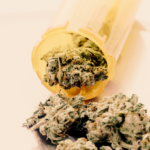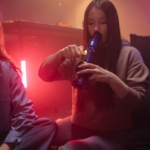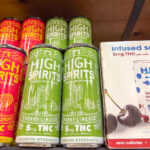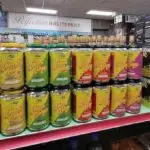
Speaking of the “Magic Mushroom” chocolate bars in question, store management said, “[the DEA] … had done their own lab testing on the products and some … did not pass their standards.”
Amidst an already chaotic national election season, in Massachusetts, psychedelics are also making political headlines, with Question 4, the Legalization and Regulation of Psychedelic Substances Initiative, appearing on the upcoming November ballot.
Meanwhile, MDMA and entheogens including psilocybin have moved closer to the center of national drug reform efforts and the surrounding policy debate. For the most part, the accompanying mainstream discourse has focused on currently illicit and illegal psychedelic substances.
However, the growing public interest in psychedelics has also had another effect—it’s steadily fueling a murky gray market “legal psychedelics” industry with potentially harmful “magic mushroom” candies, vapes, and chocolate bars showing up on retail shelves across the country and online.
One such brand in particular, Diamond Shruuumz, made the news this year after its products—marketed as microdose-able chocolate bars and flavored candies—were linked to dozens of hospitalizations and two potential deaths, prompting the US Food and Drug Administration to issue an initial warning on June 7. After a joint investigation alongside the Centers for Disease Control (CDC), the FDA then issued a nationwide recall of all flavors of Diamond Shruumz products on June 28.
Subsequent reporting on the Diamond Shruumz recall by Michelle Lhooq of DoubleBlind magazine revealed that Prophet Premium Blends LLC, the Santa Ana, California-based parent of Diamond Shruumz, was manufacturing its products under sketchy circumstances.
Subsequent FDA and CDC test results revealed that at least some Shruumz products contained an increasingly controversial psilocybin analogue known as 4-AcO-DMT. Given its analogue status, some legal experts contend that it should technically be listed as a Schedule 1 substance, though this has been largely unenforced in the decades since 1986, when Congress passed the Controlled Substance Analogue Enforcement Act in an effort to crack down on so-called “designer drugs.” Currently, 4-AcO-DMT remains unscheduled and federally legal, which some experts contend is due to the vague use of the words “substantially similar” within the text of the Analogue Enforcement Act itself.
Meanwhile, this burgeoning gray market psychedelic fiasco spilled into Massachusetts last week. Or rather, it was allegedly shipped here.
Last Thursday, federal and local law enforcement officers entered deVINE, a self-described health and wellness apothecary on East Broadway in South Boston. According to one employee, some agents reportedly had guns drawn. The action was flagged by Caught in Southie, which reported that a cadre of bulletproof vest-cladden DEA agents and BPD cops were seen “patiently waiting” in front of the store’s small retail shop at around 1:30pm on Sept. 19.
According to a subsequent statement issued by deVINE that same day, the feds stopped by specifically to “confiscate” a shipment of two specific “nootropic and adaptogen products” on the deVINE menu. Store management noted that “all of our products… were accompanied by third party certificates of analysis showing they are safe to consume and compliant with state and federal regulations.” During the police action, though, “[the DEA] informed us they had done their own lab testing on the products and some of them did not pass their standards.”
A lab report listed on deVINE’s site for the Road Trip Desert Stardust gummies in question was conducted over a year ago—on Aug. 24, 2023 by San Diego, California-based SDPharma Labs. Those results indicate that the gummies were tested for dimethyltryptamine (DMT), psilocybin, psilocyn, and multiple additional tryptamines, all of which were not found in the products tested at the time.
Additionally, a lab report provided by deVINE for One Up Chocolates, the other product that was of great interest to the DEA, indicates that while psilocybin, psilocyn, and 4-ACO-DMT were not found in the flavors tested, minor amounts of muscimol, also known as Amanita muscaria extract, were present in the test samples. The chocolates in question were also found to contain trace amounts of tryptophan, an essential amino acid found in everything from red meat to many common dietary supplements, and adenosine triphosphate (ATP), an organic compound and “building block of RNA” that has a wide variety of medical uses including heart rate and blood flow regulation. These substances are legal, though mixing them together can have unpredictable and unpleasant results.
Asked about the store’s exchange with the DEA, management said that deVINE requested copies of the supposedly damning test results, but federal agents on the scene last Thursday did “not present … these lab reports.” They reportedly told staff members that law enforcement testing found that deVINE’s out-of-stock “Road Trip Gummies and One Up Chocolates tested positive for psilocybin.”
The store’s official statement asserted that management “had no knowledge of this recall and will be contacting the manufacturers directly to voice our serious disappointment.” The note added, “We continue to work side by side with the Boston board of health and law enforcement to ensure our products are compliant and safe for our customers. … The lab reports presented to us by the manufacturers of these products did not show this so we are investigating this matter further.”
As of Monday, the DEA’s New England Division media officer has not responded to multiple requests for comment on what they were doing at deVINE.
























